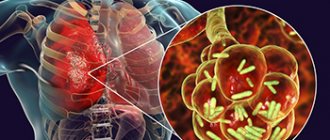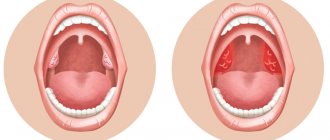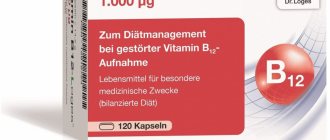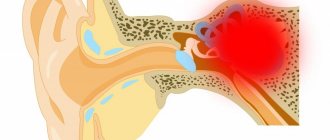Azithromycin: indications for use and contraindications
The manufacturer's instructions for the drug indicate the following pathologies for which the drug is sufficiently effective:
- inflammatory processes in the respiratory tract, with the formation of sinusitis, tonsillitis, pharyngitis, laryngitis, otitis media, pneumonia or exacerbation of chronic bronchitis;
- damage to the genitourinary tract without secondary complications - urethritis, cervicitis;
- infection of the dermis and soft tissues - infectious superficial pyoderma, erysipelas, dermatitis;
- initial borreliosis, scarlet fever, gastrointestinal pathologies associated with Helicobacter pylori.
The medication is not prescribed for complex diseases of the kidneys, liver, or allergic reactions to macrolides. The suspension is not used for babies weighing no more than 5 kg, and tablets and capsules - less than 45 kg.
University
→ Home → University → University in the media → Does a sore throat need to be treated with antibiotics?
Sore throat, chronic tonsillitis - thousands of people are familiar with these diagnoses. Is it possible to get rid of a sore throat forever? How long should you take antibiotics? Is it possible to prevent this disease?
Assistant of the Department of Infectious Diseases of the Belarusian State Medical University, Candidate of Medical Sciences Nikita Solovey answered these and other questions from Komsomolskaya Pravda readers on a direct line
— I have chronic tonsillitis. For the last year, my sore throats have gone away without fever, but with stomatitis. Maybe some kind of prevention can be done?
— How does stomatitis manifest itself?
- Very painful ulcers appear in the mouth.
- Perhaps this problem is not related to your chronic tonsillitis. Stomatitis can be caused by other causes; you need to be examined by specialists who deal with the mucous membranes of the oral cavity, for example, dentists.
— And I also have constant traffic jams.
- If you do not have a fever or severe sore throat, topical medications with anti-inflammatory and antimicrobial effects may be effective, for example, evidence of effectiveness in studies has been obtained for nanocolloidal silver, extracts of certain algae and herbs. These remedies can also be useful for stomatitis.
— Why does chronic tonsillitis occur in general? Is this all due to reduced immunity?
- No, this is a feature of inflammation of the tonsils, which develops in response to the influence of certain microorganisms, often with not entirely correct treatment of repeated episodes of sore throat.
— If sore throats occur two or three times a year, is this an indication for tonsil removal?
— To date, research results show that in adults, removal of tonsils often does not lead to a reduction in the number of recurrent inflammations of the oropharynx. In fact, the final decision on indications is made by otolaryngologists during long-term observation of the patient.
Antibiotics must be taken for at least 10 days
— My son is already in the 8th grade, and since the 5th grade he has been tormented by sore throats. Now they are literally every two weeks, he practically does not go to school. Sore throat manifests itself only with a high temperature, up to 38 degrees. He was already in the hospital. Constantly takes antibiotics. The analysis showed that he had staphylococcus. What should we do?
— Recurrent tonsillitis is a common situation. It is extremely important to adequately treat each exacerbation with the correct course of antibiotics. It is not necessary to use injections; today, most antibiotics are highly effective when taken orally. It is important to carry out 10-day courses of antibacterial therapy. Otherwise, you get a clinical effect - the sore throat goes away, the temperature drops, but the pathogen on the tonsils remains.
— Is it possible to undergo any other examination besides the smear that revealed staphylococcus?
“Unfortunately, most studies do not show the real picture, since we can only examine the microflora from the surface of the tonsils. And in patients with chronic tonsillitis, as studies show, deep in the tonsils there may be a completely different microflora. Therefore, it is more important to adequately treat each episode of exacerbation.
- I'm already desperate. Taking antibiotics so often is also harmful.
— Even frequent use of antibiotics used in modern outpatient practice does not have any long-term consequences. It's a delusion. They can of course have side effects during treatment, just like any other medicine. But those drugs that are approved in our time do not have serious long-term consequences.
- I am 40 years old. The throat is constantly inflamed. Maybe I should have my tonsils removed? My doctor says that problems with the heart and joints may begin.
- At your age, removing your tonsils will not do any good. Problems with the heart and joints can be caused by frequently recurring tonsillitis caused by streptococcus pyogenes. This pathogen is more typical for children and adolescents and is rarely found in older people. In the case of chronic pharyngitis, during exacerbations, drugs with local antimicrobial and anti-inflammatory effects, for example, containing nanocolloidal silver or medicinal plant extracts, can be used.
A virus can also cause a sore throat
— Is it possible to do without antibiotics for a sore throat?
— It all depends on what kind of sore throat the patient develops. There are sore throats that are caused by bacterial pathogens, most often streptococcus pyogenes. But there are sore throats that are caused by respiratory viruses, and then antibacterial therapy is not needed. There are symptoms that practically exclude the bacterial nature of a sore throat: if, in addition to complaints of sore throat, plaque on the tonsils, and fever, there is also conjunctivitis, or a cough, or diarrhea, or a rash. This most likely indicates the viral nature of the disease and requires the use of only agents with a local anti-inflammatory effect.
— I had my tonsils removed when I was a child. And now, as I understand it, doctors are in no hurry to prescribe such an operation.
— First, you always need to adequately treat a sore throat. If this is not done, an acute, frequently recurring process can become chronic.
— I heard that tonsils are not completely removed, but only trimmed.
— There is no scientific evidence of the effectiveness of this procedure. We must understand that by removing the tonsils, we prevent frequent relapses of sore throat, but we open the path of infection to the upper respiratory tract. The tonsils are a barrier organ of the immune system. Recent studies show that the rate of recurrence of acute respiratory viral infections in children whose tonsils were removed is two and a half times higher than in those children who were not operated on. Therefore, tonsils should be removed when there is a real threat of the formation of acute rheumatic fever with consequences in the form of damage to the heart and joints, or when tonsillitis often recurs and ongoing antibacterial therapy becomes ineffective. In addition, not all patients are predisposed to rheumatic complications. Therefore, if we generalize the world experience, there are no clear instructions under which it is definitely necessary to remove tonsils. Everything is decided individually.
Do exercises and don't get too cold
— I am 46 years old, and I have had chronic tonsillitis since childhood. Maybe you can recommend some drug that needs to be taken constantly?
— How does your tonsillitis manifest itself?
— There are seasonal exacerbations, when the throat gets sore and congestion appears.
— Is the temperature rising?
- Not anymore.
— If an exacerbation occurs with a high fever and severe sore throat, it is important to be treated with a 10-day course of oral antibiotics. This course cannot be shortened, even if the patient begins to feel well. Together with the antibiotic, you can use local agents with antimicrobial action. In case of erased exacerbations, it is permissible to use only local remedies.
— Are there methods for preventing or preventing angina?
— Of the methods that have proven effectiveness in treating frequent sore throats, the only effective one is the long-term use of antibiotics with prolonged action. Injections of such antibiotics are given to the patient once a month for a long time. But such prevention is prescribed for very serious reasons, when a person has more than six sore throats per year or there is a threat of rheumatic complications.
In other cases, you just need to carry out general preventive measures: observe a rational work and rest schedule, eat right, develop physically, take multivitamins.
— Does hypothermia affect the occurrence of sore throat?
- Certainly. Hypothermia can lead to an acute or exacerbation of a chronic process. Tonsillitis pathogens live in our oral cavity anyway, but often they cannot realize their pathogenic potential until some predisposing factor occurs. And hypothermia is just that.
— Do rinsing with herbs help?
- Perhaps only at the very initial stage and with viral sore throats. If a real bacterial sore throat has developed, you cannot do without antibiotics. Komsomolskaya Pravda , November 24, 2015
Share
Adverse reactions during therapy
Frequent clinical signs of the occurrence of a non-standard effect on treatment include:
- problems with visual acuity;
- attacks of vomiting with nausea;
- discomfort in the abdominal area;
- insufficient lymphocyte content;
- disturbance of acid-base balance in the blood.
Almost 1% of patients experienced the following:
- vaginal infections, oral candidiasis;
- vestibular dysfunction, constant drowsiness;
- convulsive syndrome, insufficient presence of leukocytes in the blood;
- cephalgia, loss of sensitivity of receptors responsible for taste and smell;
- constipation, digestive problems, active gas formation;
- gastroduodenitis, rapid loss of strength;
- vaginitis, dermatological rashes, obsessive itching.
Adverse reactions to Azithromycin in 0.1% of those undergoing treatment were:
- increased neutrophil content, decreased platelet count;
- anemia of hemolytic origin;
- increased activity, unreasonable excitement;
- anxiety, outbursts of aggression;
- asthenic syndrome, tingling sensation, ants moving across the skin;
- lethargy, neuroses, insomnia;
- discoloration of the skin in a yellow tint, symptoms of hepatitis;
- Quincke's edema, nettle fever, severe photosensitivity;
- exudative erythema – polymorphic, malignant course;
- anaphylactic shock, fungal infection.
Occasionally, an acceleration of the heart rate, ventricular arrhythmia, and pain in the chest space are recorded. Similar symptoms can be provoked by other macrolides. Antibiotics can cause a decrease in blood pressure and increase the QT interval.
Sometimes a decrease in hearing acuity, asthenic bulbar palsy, motor restlessness, liver dysfunction, hepatitis with necrotic complications are recorded. In most cases, adverse reactions occurred in patients taking Azithromycin in high dosages for a long period. Studies have shown that the resulting consequences are reversible.
Azithromycin, tablets coated. captivity. about. 500 mg, 3 pcs.
Infectious diseases: infrequently - candidiasis (including the mucous membrane of the oral cavity and genitals), pneumonia, pharyngitis, gastroenteritis, respiratory diseases, rhinitis; unknown frequency - pseudomembranous colitis.
From the blood and lymphatic system: infrequently - leukopenia, neutropenia, eosinophilia; very rarely - thrombocytopenia, hemolytic anemia.
From the side of metabolism: infrequently - anorexia.
Allergic reactions: uncommon - angioedema, hypersensitivity reaction; unknown frequency - anaphylactic reaction.
From the nervous system: often - headache; infrequently - dizziness, disturbance of taste, paresthesia, drowsiness, insomnia, nervousness; rarely - agitation; unknown frequency - hypoesthesia, anxiety, aggression, fainting, convulsions, psychomotor hyperactivity, loss of smell, perversion of smell, loss of taste, myasthenia gravis, delirium, hallucinations.
From the side of the organ of vision: infrequently - visual impairment.
From the organ of hearing and labyrinthine disorders: infrequently - hearing loss, vertigo; unknown frequency - hearing impairment up to deafness and/or tinnitus.
From the cardiovascular system: infrequently - palpitations, flushing of the face; unknown frequency - decreased blood pressure, increased QT interval on ECG, ari, ventricular tachycardia.
From the respiratory system: infrequently - shortness of breath, nosebleeds.
From the digestive system: very often - diarrhea; often - nausea, vomiting, abdominal pain; uncommon - flatulence, dyspepsia, constipation, gastritis, dysphagia, bloating, dry oral mucosa, belching, ulcers of the oral mucosa, increased secretion of the salivary glands; very rarely - change in tongue color, pancreatitis.
From the liver and biliary tract: infrequently - hepatitis; rarely - impaired liver function, cholestatic jaundice; unknown frequency - liver failure (in rare cases with death, mainly due to severe liver dysfunction), liver necrosis, fulminant hepatitis.
From the skin and subcutaneous tissues: uncommon - skin rash, itching, urticaria, dermatitis, dry skin, sweating; rarely - photosensitivity reaction; unknown frequency - Stevens-Johnson syndrome, toxic epidermal necrolysis, erythema multiforme.
From the musculoskeletal system: uncommon - osteoarthritis, myalgia, back pain, neck pain; unknown frequency - arthralgia.
From the kidneys and urinary tract: infrequently - dysuria, pain in the kidney area; unknown frequency - interstitial nephritis, acute renal failure.
From the genital organs and mammary gland: infrequently - metrorrhagia, dysfunction of the testicles.
Local reactions: often - pain and inflammation at the injection site.
Other: infrequently - asthenia, malaise, feeling of fatigue, facial swelling, chest pain, fever, peripheral edema.
Laboratory data: often - a decrease in the number of lymphocytes, an increase in the number of eosinophils, an increase in the number of basophils, an increase in the number of monocytes, an increase in the number of neutrophils, a decrease in the concentration of bicarbonates in the blood plasma; infrequently - increased activity of AST, ALT, increased concentration of bilirubin in the blood plasma, increased concentration of urea in the blood plasma, increased concentration of creatinine in the blood plasma, change in the potassium content in the blood plasma, increased activity of alkaline phosphatase in the blood plasma, increased chlorine content in the blood plasma, increased blood glucose concentration, increased platelet count, increased hematocrit, increased plasma bicarbonate concentration, change in plasma sodium content.
When you can't do without antibiotics
In otolaryngology, antibiotics are widely used. They are indicated for use in cases of bacterial tissue damage, when there is a risk of complications, since the body cannot cope with the pathogen on its own. The main diseases that are treated with antibiotics are sore throats, sinusitis and otitis media.
In order to determine that antibiotics are required, a swab is taken from the throat, nose or ear. The obtained material allows not only to identify a specific pathogen, but also to determine which medicine it is most sensitive to.
The main indications for treatment with antibiotic compounds are bacterial infections in which there is no positive result from other therapy, and there is also a high probability of developing severe complications. Also, the drug will be prescribed without fail in the presence of secondary infection and after surgical interventions.
Depending on the characteristics of the patient’s body, drugs can be used for local or general action. They are available in the form of sprays, tablets, capsules or injection solution. The latter form is considered safer, since it disrupts the intestinal microflora to a lesser extent.





